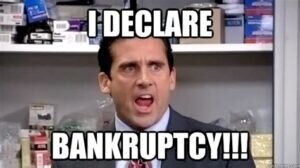God Mode Activated
Through the torpid haze of Saturday afternoon a voice came to shake me from my doze on the couch.
To make a bow, say, ‘BOW!’
The voice belonged to Blaze, I believe, of the Nick Jr. program Blaze and the Monster Machines, which my daughter happened to be watching this particular Saturday afternoon. In my mind’s eye I see the Philosophical Fathers of America shaking their hoary brow that I should doze as such pixelated inanity shone upon my family. So be it.
I did not open my eyes, but I listened somewhat more attentively as Blaze, from what I blearily gathered, called on the children of America to lend him their voices as he transformed himself into a crossbow on the strength of words alone (perhaps Blaze enjoys Yeats of a post-production evening).
At any rate, the most cursory, dozing survey of children’s television reveals the same pattern. When a problem arises, our protagonist need often do no more than say the right word and watch the problem vanish. We see it in Paw Patrol, wherein the canine first responders call out for the requisite tool, which emerges from the airplane or bull dozer or fire truck and patches the hull or whisks the baby dinosaur from disaster. We see it in Dora the Explorer, with whom we cry out “Map!” and watch as Map obligingly appears. Who of the author’s age does not recall Matthew Broderick calling “Go go Gadget oil slick!”?
In this linguistic power lies something of the feeling of deus ex machina, and this because the mode of action is that typically reserved, in the Bible at least, for God. The labor of Genesis is a labor of speech. Much of the power of Christ’s ministry resides in the power of his words to do things. When he tells the lame to walk, they walk. When he tells the blind to see, they see. Again and again the world orders itself according to his word, so that when at last he says, “This is my body,” we take him as more than metaphorical.
The heroes of children’s television have discovered that, like God, they can save the day by words. We see it in adult television, too, of course. Michael Scott, mired in money problems, believes he has found the solution when he cries “I… declare… BANKRUPTCY!!!” Oscar the accountant gently reminds him that there’s more to it than that. We have mentioned Inspector Gadget. Many of the endless James Bond parodies derive their comedy from the heroes’ miraculous victories, from their uncanny knack for having the perfect tool for the job at all times. Who but Clousseau can achieve such justice through bumbling? Who but Austin Powers can lend force to his attacks by shouting “Judo chop!”?
What we admire about the real Bond is that he employs consummate skill and takes endless punishment in the course of the mission. What we wonder at in Aslan the lion, who calls Narnia into being by song, is that he does not simply sing the Witch out of being or sing Edmund back into grace. He pays with his blood.
And so what is funny in the parodic pageant of spy game spoofs and office space sitcoms, this facile declaration of that state of affairs we most need, becomes, in the context of children’s entertainment, a melancholic comment on American ideologies of identity. The self in America today springs from verbal declaration and nothing more. If I am man or woman it is not by God or by nature but by my own command, and I may indeed be neither. I say I am whatever I feel, and like Blaze I call upon the children of America to say so with me. So far have we plunged into the bottomless end of nominalism that the substantial language of the classical tradition has been entirely removed from conversation. No longer may we say, “She is a woman,” or “He is a man.” We get the sense we are bound not to call that meowing thing a cat or that barking thing a dog. “The just man justices,” writes Hopkins. In America today we are told, in short, that we may only say, “The I I’s.” Nothing more.
Our personhood has become as empty as the plots of our children’s programs. But where in our increasingly brilliant enlightenment has joy hidden itself? Perhaps, in part, it has hidden itself in words. As more and more the power of words is touted in television and the politics of personhood, we sense more and more that words alone are not, in fact, certain good, that that description belongs rather to one Word, who took on flesh and healed the lame and hung crowned and bleeding for our sins one Friday afternoon. Praise him.


